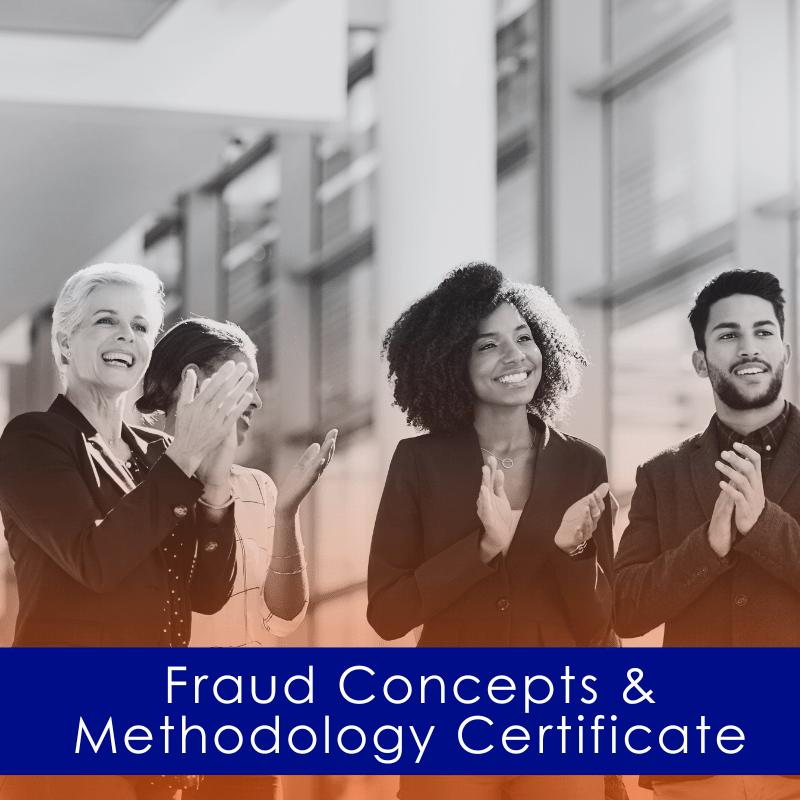Description

Step Forward to a Financial Crimes Career
Reach a new level in a career of fraud investigations in the financial space. Stand out and fit in by earning an AML-ology Fraud Concepts and Methodology certificate.

What careers are a good fit for transitioning to the financial crimes industry?
- Accounting
- Auditors
- College graduates
- Military
- Law-Enforcement
- Financial institution employees – tellers/bankers, call center agents, lenders, etc.

Earn this certificate to boost your career in
- Financial Crimes Analyst
- Financial Crimes Investigations
- Financial Crimes Quality Assurance
- Financial Crimes Technology
- Financial Crimes Audit
- Financial Crimes Compliance
- Financial Crimes Data Analytics
- Financial Crimes Leadership
- Corporate Investigations, Insider Threat, and/or Employee Relations

Who Should Consider Earning This Certificate?
New or transitioning industry professionals – if you are new to, or you are attempting to transition to the profession, this course will provide you with a strong foundational base in industry knowledge that you can build upon as your skills develop.
Seasoned professionals currently working in the industry – if you are a seasoned professional that is already working in the industry, this will be a great “back-to-basics” course that will discuss concepts not often discussed at this level.
Financial crimes program managers – if you are a fraud program manager or director, the course is a perfect option for providing your entire team with comprehensive fraud training.
Modules covered in this training:
Modules covered in this training:
Duration 16:20
A holistic overview of criminology from the mindset of a fraudster, cybercriminal, and/or money launderer.
Duration 32:05
Understanding the difference and importance between critical and analytical thinking to give practical based application to financial crimes investigations.
Duration 19:21
Throughout your career in the financial crimes industry, you will be tasked with making a variety of risk-based decisions. This module will provide you with a comprehensive understanding of risk categories as well as how to minimize risk to your organization.
Duration 16:07
An overview of acronym identification and financial crime specific terminology will be provided in this module.
Duration 1:05:25
A holistic overview of the detection, analyst, investigations, and reporting function within a financial institution will be discussed in this section.
Duration 23:25
Compare and contrast fraudulent schemes and scams as a Specified Unlawful Act (SUA) or predicate offense and how these crimes impact our customers and members.
Part 1 - Duration 1:17:41
Part 2 - Duration 44:24
We will discuss various fraud typologies as well as the financial institution products and services they impact.
- Cyber Fraud
- Credit/Debit Card Fraud
- Check Fraud
- Elder Financial Exploitation and Vulnerable Adult Abuse
Duration 1:25
Certificate vs. Certification Program
As AML-ology strives to be the one stop shop for all your financial crime training needs, we will begin to build onto our digital course catalog by launching additional certificate and certification programs. The two terms are often used synonymously and although they are similar, they are not the same. Let’s discuss the differences between the two.
Certificates are great options for professionals that are just starting out or are new to an industry as well as seasoned and experienced professionals looking to gain additional knowledge on a specific topic.
Certificates are microlearning engagements specified for a certain topic. Certificates can be issued after completing a full-length course or they can be awarded after attending webinars commonly called “certificates of completion.”
Certificate content often has oversight by Subject Matter Experts (SMEs) and/or advisory board members. Certificates do not offer credentials or acronyms after your name and do not require continuing education to maintain and renew.
A professional certification is a training program that covers a broader topic and is in greater depth than certificates. Certifications usually have predetermined and standardized criteria that require the participant to pre-qualify in order to take the course. Some of the criteria may be secondary education, years of experience in a particular industry, prerequisite courses, etc.
It is common practice for the certification program require an assessment, quizzes, tests, projects submitted, etc. to display understanding or even mastery of the delivered content. Upon successful completion of certification programs, you will be permitted to display credentials after your name to designate you as a holder of that certification. Common financial crimes industry certifications are: Certified Fraud Examiner (CFE), Certified Anti-Money Laundering Specialist (CAMS), etc. Certifications require continuing education to maintain and renew.
“Continuing education” is qualified training programs that upon completion demonstrate ongoing knowledge in a specific industry. These requirements are commonly called Continuing Education Units (CEUs), Continuing Education Credits (CECs), Professional Development Units (PDUs), Professional Development Credits (PDCs), etc. The determination of whether a training program qualifies as continuing education to maintain and renew your certification will be at the discretion of the issuing body of the certification. The issuing body also makes the determination of how many continuing education credits are required within a certification term.
Some certifications require renewal every year, some are every two or three years, others have longer certification terms such as five years. Webinars and certificates often qualify for continuing education credits. Please consult with the issuing body of the certification you are attempting to obtain or renew for the outline of their program requirements.
Browser Compatibility
It is extremely important that you use a supported browser when using AML-ology so that all course content and the course tools display properly and to avoid usability errors related to browser configurations. The very latest editions of Mozilla Firefox, and Google Chrome should work fine on most devices. We do not recommend using Apple Safari or Microsoft Edge, and Microsoft Internet Explorer is no longer a supported browser. We recommend installing both Chrome and Firefox browsers for use with our technologies, especially if one results in an error message. Please try using a different browser to see if you experience the same results before contacting help desk support.

